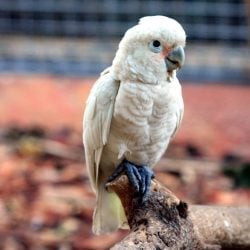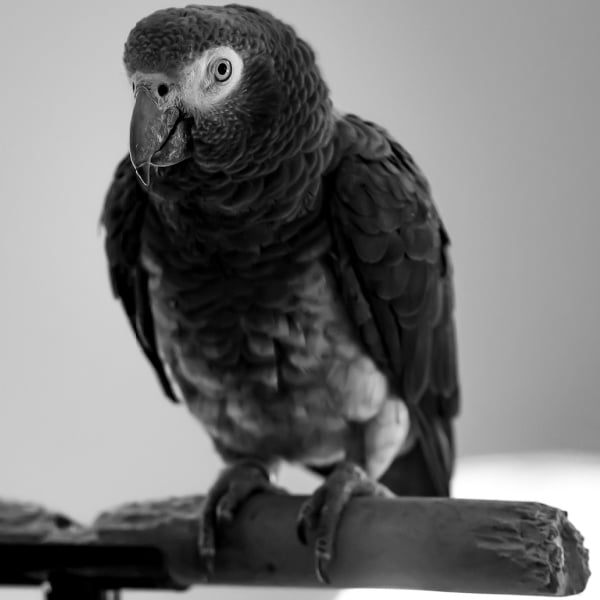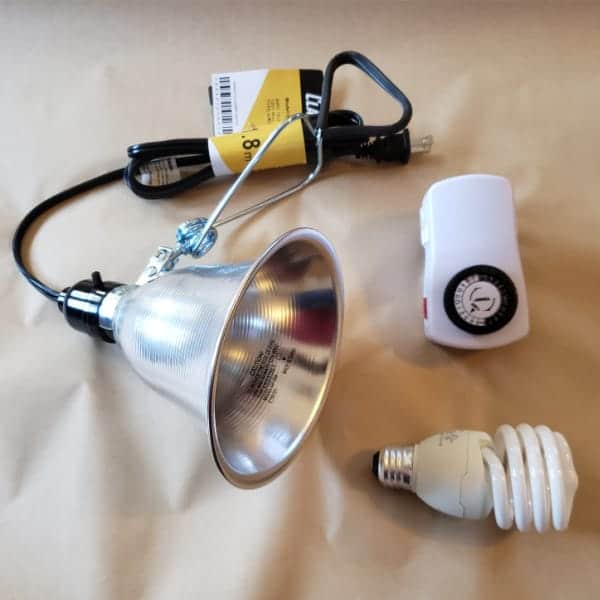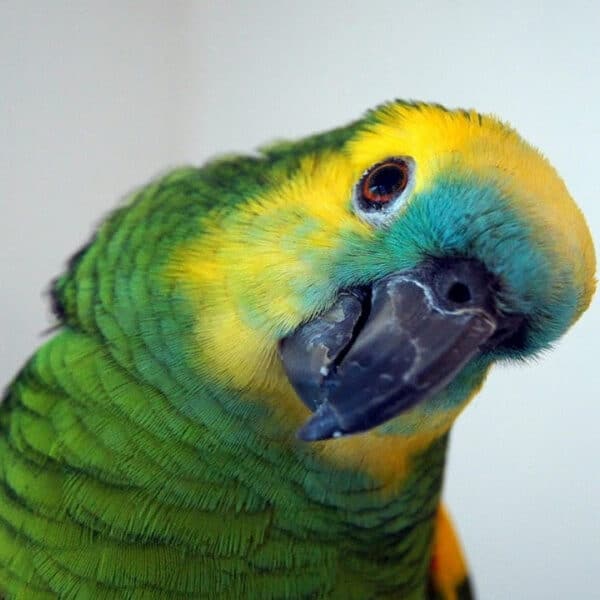Last Updated on by Mitch Rezman
Tammy F. is worried about her bird’s territorial issues,
Yogi, my timneh African grey parrot has taken over our bedroom dresser and nightstand drawers. He learned to open them months ago, he loves getting in there and throwing everything out.
I let him have fun with it but now when my husband goes to get into the drawers Yogi does a dive bomb to his head. He does it to me also but I’m more aware of him and know he’s coming and divert him.
He does not want anyone in “his” drawers. He gets locked in his cage for this behavior sometimes but he knows when we are going to put him in his cage and he flys off.
He’s very smart and very spoiled. He does not like being in his cage. He roams the house with our 2 dogs and whichever room we are in he is usually in. Suggestions for his territory issues??
Dear Tammy
We LOVE your story, it is hilarious and charming, but yes, it has to stop now. Sorry to say, you brought this on yourself. We know it was all with good intentions but…
Big parrots are like little kids to us and can be great fun as they toddle about, playing with toys, accepting hugs and kisses, and making cute noises.
But they are in effect wild animals with hormones that can be affected by our affections and how we handle and house them.
In the wild, an African Grey would seek out hidey holes to build a nest so they can raise a family. Your bed and end tables have become your bird’s nesting places and now she, yes, she, is now protecting the nest and chasing you out as you really are not fitting in fully with her plans.
Back to the sex. Most likely it is a female as they are likely the ones that will develop broody behavior. Males can act aggressively but are less likely to seek out a nest.
Birds do not have to have sex to develop an interest in nesting, or even to lay eggs. It all is in their brain and certain things can trigger them that it is time to do so.
Triggers can be physically brought on by you, so keep your hands off the bird’s body, and instead, offer her head and neck scritches only. They will be appreciated and not arouse them.
Dim cage and play areas also encourage nesting behavior, so increase the lighting over the play stands and cages. If you have a tray in the top of the cage under a play area, remove it and do not return it to the cage.
Install a bright daylight or full-spectrum bulb as close to the top of the cage
as possible and put it on a timer set 12 hours on and 12 hours off daily, forever as in the video ~ above
We find 8:30 am to 8:30 pm works well in the summer and when DST kicks in, it is automatically 7:30 am to 7:30 pm through the winter. Covering the cage at night is good if your bird is in a high-traffic area where you tend to stay up late, but don’t cover for more than 12 hours and never cover the cage to keep the bird quiet during the day.
Now, how to break this?
Well, your bird can no longer come into your bedroom. Start keeping the door closed as well as any other places with dark, cozy places that could become a nest.
If there are any huts, beds, or piles of shredded or shreddable anything in the cage, it has to come out. All toys should be hanging and attached to the inside cage walls and not able to rest on top of the bird or block the light from above. If you have a cage cover that you leave half on the cage all day, it has to come off.
By the way, putting your bird in its cage after it has tossed items out of drawers, attacked one of you, etc is of little help as birds are amoral and they do not connect you’re locking her up with the bad behavior. Best to avoid the things, opportunities to be bad to start with. Distract, distract, distract.
You may wish to give your bird a light treatment to break the broody cycle that is now in place.
Full Spectrum Economy Daylight Bulb with Clamp Light & Timer
You would install strong lighting over the top of the cage, as close as possible to the cage top.
Remove any toys that would block the light. They can be placed along the inside of the cage bars, but not dangling over the bird.
You want the light to be fully on the bird. Put the bird in its cage and close the door and leave the light on for three solid days and nights.
The light resets the Circadium Rythem within the Pineal Gland that is affected by the light through their eyes.
After 3 days and nights under the light, the bird should abandon interest in nesting, broody behavior.
Take a deep dive and explore the relationship between fighting and birds.
If after a day the behavior resumes, you can do the light treatment for 7 days in a row.
The bird will eat, nap, call out at all hours, but it is not harmed in any way.
You can come to the cage and talk to the bird, offer cheerful company, but keep the bird under the light for the entire treatment.
Best to avoid trying to touch the bird during this time as she may lash out at you in her frustration which won’t help the situation.
Once the 3-day (or the extended 7-day) treatments are done, you can go back to normal behavior, just keep your hands off the bird’s body from now on (no cuddling, no blankies, no stroking).
Now, this may seem impersonal, but birds don’t do cuddles or have physical contact with each other, other than head preening because they can’t reach them themselves.
The only time birds get physical is when they are mating or preparing to mate in the winter months which is why you need to set the lighting up 12 hours on and 12 hours off to replicate the hot tropical summer, 365 days a year.
If the only way you can handle the bird to take her into her cage without flying off is to clip her wings this one time, then you may need to do so. A short clip that will allow her to coast to the ground and not soar is fine.
Once clipped, put her on the floor so when she tries to fly, she won’t crash down and learn her limitations. Once the feathers molt out and regrow, you may have everything back to normal.
Feel free to reach out for more information.
Catherine
By the way, we would love pictures of your bird and her cage.
Author Profile

Latest entries
 Bird & Parrot CareJune 20, 2025Understanding the Best Way to Use Prevue Pets Mimic Me Voice Trainer
Bird & Parrot CareJune 20, 2025Understanding the Best Way to Use Prevue Pets Mimic Me Voice Trainer Bird BehaviorJune 6, 2025How Do I Keep My Parrot From Dumping His Food Every Day?
Bird BehaviorJune 6, 2025How Do I Keep My Parrot From Dumping His Food Every Day? Birds & LightingMay 16, 2025I Am Seeking Clarity About Lighting for My Birds Cage
Birds & LightingMay 16, 2025I Am Seeking Clarity About Lighting for My Birds Cage Bird RescueApril 29, 2025How Do We Re-Home a 17 yr Goffin Cockatoo?
Bird RescueApril 29, 2025How Do We Re-Home a 17 yr Goffin Cockatoo?



